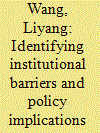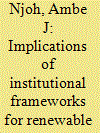| Srl | Item |
| 1 |
ID:
175248


|
|
|
|
|
| Summary/Abstract |
Large organizations wield considerable market power, their procurement activities can be leveraged to achieve social, economic and environmental goals by ‘pulling’ more desirable products into the market. However, while there is substantial research in individual consumer buying behavior and market barriers to sustainable technology adoption, less is known about large organizational buying behavior and the impact of institutional barriers in this area. To address these research gaps, we conducted an exploratory study aimed at better understanding the process through which large organizations purchase sustainable energy technologies and what internal barriers they experience during that process. We surveyed and interviewed 120 individuals involved in procurement from Californian organizations representing both public and private sectors. Survey results indicate the need to resolve the conflict between prioritizing lowest first cost and lowest life cycle cost, better engage multiple stakeholders involved in internal decision-making around purchasing, and improve existing procurement tools or offer new ones. We provide recommendations for how policymakers can apply our findings to increase the adoption of sustainable energy technologies in their own organizations and communities.
|
|
|
|
|
|
|
|
|
|
|
|
|
|
|
|
| 2 |
ID:
166364


|
|
|
|
|
| Summary/Abstract |
This study analyzed a rural renewable energy project—the Esaghem Village solar photovoltaic-based electrification project—in Manyu Division, Cameroon. The aim was to unveil impediments to the project rooted in the country's institutional framework for energy policy administration. The framework adheres to the country's Weberian-style administrative machinery. Conspicuous features of the machinery, including its pyramidal structure, tendency for top-down hierarchical communication, aversion for interorganizational interaction, and standardization are shown to constitute major institutional impediments. These features caused problems such as a lack of information, skills, and innovation. They also exacerbated problems relating to custom formalities and stand to threaten project sustainability. Administrative reform actions including the promotion of inter-organizational coordination, administration decentralization reinforced with the creation of renewable energy extension programs, and market-oriented liberalization measures are recommended. These reforms promise to facilitate the diffusion of solar PV electrification and other renewable energy technologies in Camerooon and other developing countries.
|
|
|
|
|
|
|
|
|
|
|
|
|
|
|
|